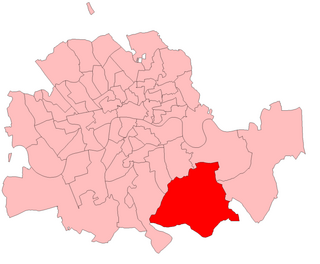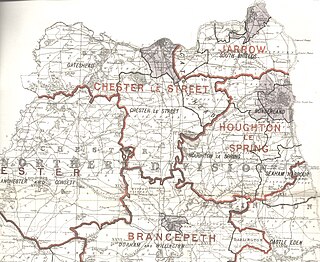Related Research Articles

The 2010 United Kingdom general election was held on Thursday 6 May 2010, with 45,597,461 registered voters entitled to vote to elect members to the House of Commons. The election took place in 650 constituencies across the United Kingdom under the first-past-the-post system.
Wednesbury was a borough constituency in England's Black Country which returned one Member of Parliament (MP) to the House of Commons of the Parliament of the United Kingdom from 1868 until it was abolished for the February 1974 general election.
The 1904 Normanton by-election was a Parliamentary by-election held on 1 March 1904. The constituency returned one Member of Parliament (MP) to the House of Commons of the United Kingdom, elected by the first past the post voting system.
The 1913 Altrincham by-election was a Parliamentary by-election held on 28 May 1913. The constituency returned one Member of Parliament (MP) to the House of Commons of the United Kingdom, elected by the first past the post voting system.
The 1913 Newmarket by-election was a parliamentary by-election held on 16 May 1913 to fill a vacancy in the United Kingdom House of Commons for the Eastern or Newmarket Division of Cambridgeshire.
The 1892 Rossendale by-election was a parliamentary by-election held for the British House of Commons constituency of Rossendale in Lancashire on 23 January 1892. It was one of the most important political contests in the struggle over Irish Home Rule and a pointer to the outcome of the 1892 general election which took place in July.
The 1902 Bury by-election was a by-election held in England on 10 May 1902 for the House of Commons constituency of Bury in Lancashire.

The 1891 Lewisham by-election was a by-election held on 26 August 1891 for the British House of Commons constituency of Lewisham.
The 1913 Shrewsbury by-election was a Parliamentary by-election held on 22 April 1913. The constituency returned one Member of Parliament (MP) to the House of Commons of the United Kingdom, elected by the first past the post voting system.

Sir John Plowright Houfton was a British colliery owner and politician from Mansfield in Nottinghamshire. He sat in the House of Commons from 1922 to 1923.
The 1890 Bassetlaw by-election was a parliamentary by-election held for the British House of Commons constituency of Bassetlaw in Nottinghamshire on 15 December 1890.
The 1914 North East Derbyshire by-election was a Parliamentary by-election held on 20 May 1914. The constituency returned one Member of Parliament (MP) to the House of Commons of the United Kingdom, elected by the first past the post voting system. About a third of the electorate were directly involved in the mining industry. This was the penultimate by-election to take place before the outbreak of the First World War. It demonstrated the weakness of support for the Labour party in 1914 when opposed by a Liberal party candidate.

The 1914 North West Durham by-election was a Parliamentary by-election held on 30 January 1914. It returned one Member of Parliament (MP) to the House of Commons of the United Kingdom, elected by the first past the post voting system.
The South Lanarkshire by-election was a Parliamentary by-election held on 12 December 1913. The constituency returned one Member of Parliament (MP) to the House of Commons of the United Kingdom, elected by the first past the post voting system.
The 1913 Chorley by-election was a Parliamentary by-election held on 19 February 1913. It returned one Member of Parliament (MP) to the House of Commons of the United Kingdom, elected by the first past the post voting system. Although it was a safe Unionist seat which was held, the reduction in the Unionist majority was notable.
The 1910 Liverpool Kirkdale by-election was a parliamentary by-election held in England on 20 July 1910 for the House of Commons constituency of Liverpool Kirkdale.

The 1897 Walthamstow by-election was a parliamentary by-election held in England on 3 February 1897 for the House of Commons constituency of Walthamstow. The area was then a division of Essex, and is now part of Greater London.
The 1897 Liverpool Exchange by-election was a by-election held in England on 10 November 1897 for the House of Commons constituency of Liverpool Exchange.
The 1926 North Cumberland by-election was held on 17 September 1926. The by-election was held due to the succession to the peerage of the incumbent Conservative MP, Donald Howard. It was won by the Conservative candidate Fergus Graham.

The 2015 United Kingdom general election was held on Thursday 7 May 2015 to elect 650 Members of Parliament to the House of Commons. It was the only general election held under the rules of the Fixed-term Parliaments Act 2011 and was the last general election to be held before the United Kingdom would vote to end its membership of the European Union (EU). Local elections took place in most areas of England on the same day.
References
- ↑ Obituary: Alfred Egerton, The Times, September 27, 1890, p. 10
- ↑ "The New Parliament". The Times . 7 July 1886. p. 6.
- 1 2 "Election News. Eccles Division of South-East Lancashire". Daily News . 1 October 1890.
- ↑ "The Eccles Division". Leeds Mercury . 7 October 1890.
- ↑ "Mr Egerton and The Miners". Leeds Mercury . 7 October 1890.
- ↑ "The Election in the Eccles Division". Leeds Mercury . 9 October 1890.
- ↑ "The Polling at Eccles". North-Eastern Daily Gazette . 22 October 1890.
- ↑ "The Eccles Election. Result of the Poll". Birmingham Daily Post . 23 October 1890.
- ↑ "The Eccles Election. Great Liberal Victory". Daily News . 23 October 1890.
- ↑ "Election Intelligence Lancashire (Eccles Division)". The Times . 23 October 1890. p. 5.
- ↑ The Constitutional Year Book, 1904, published by Conservative Central Office, page 147 (171 in web page), Lancashire South East